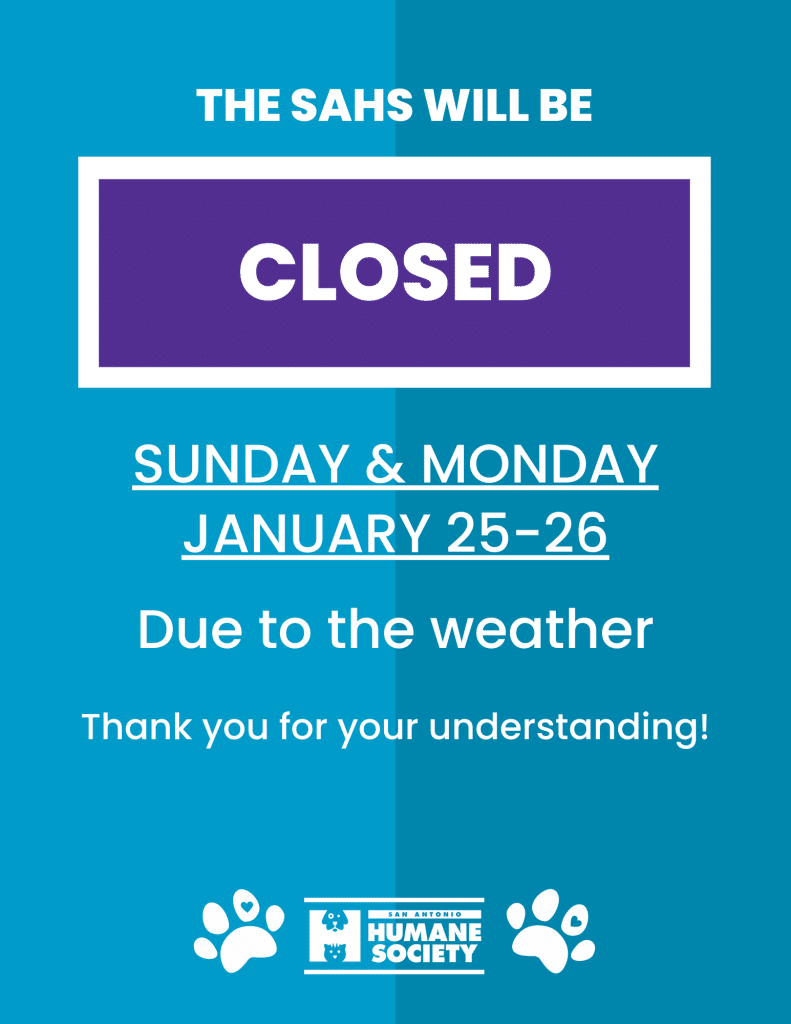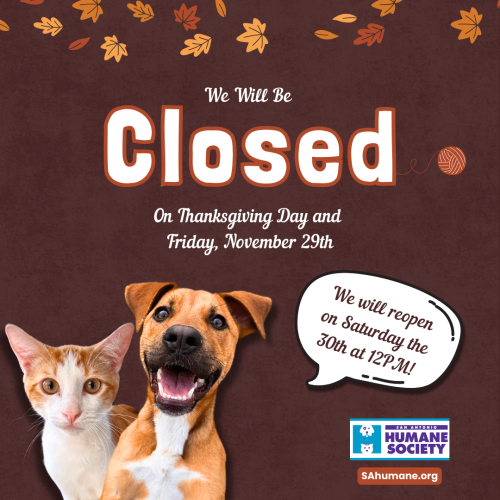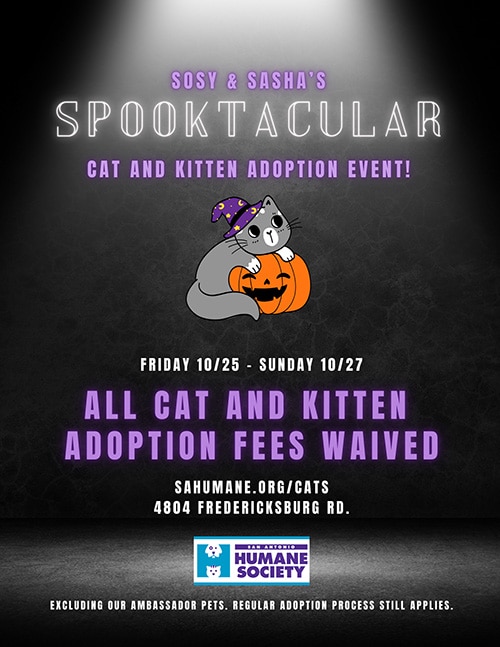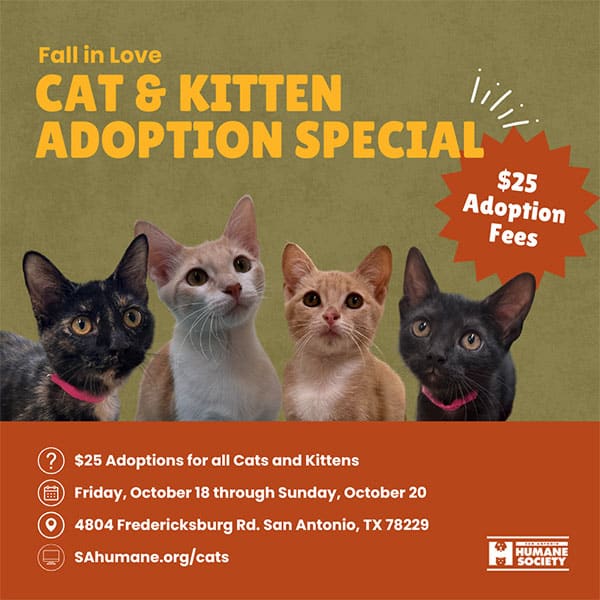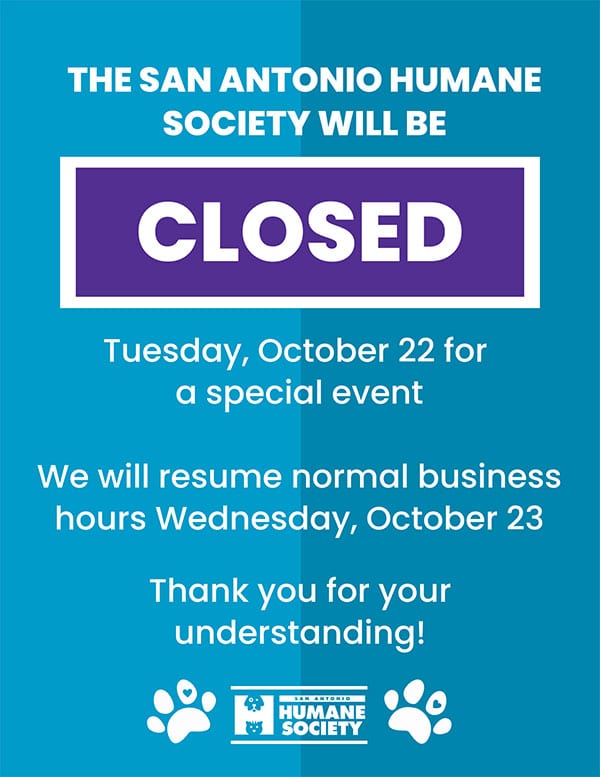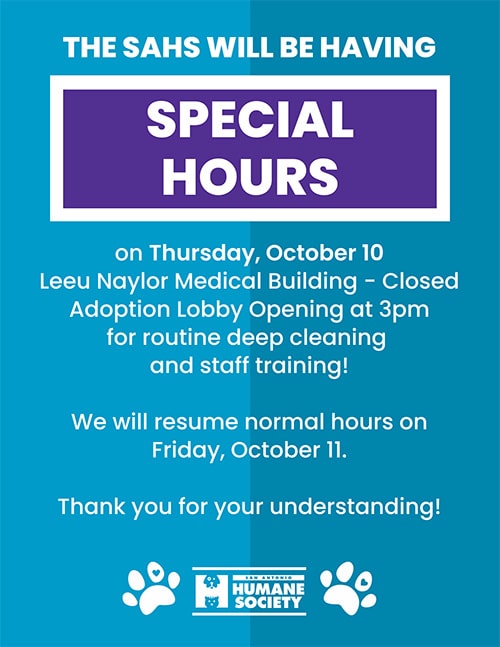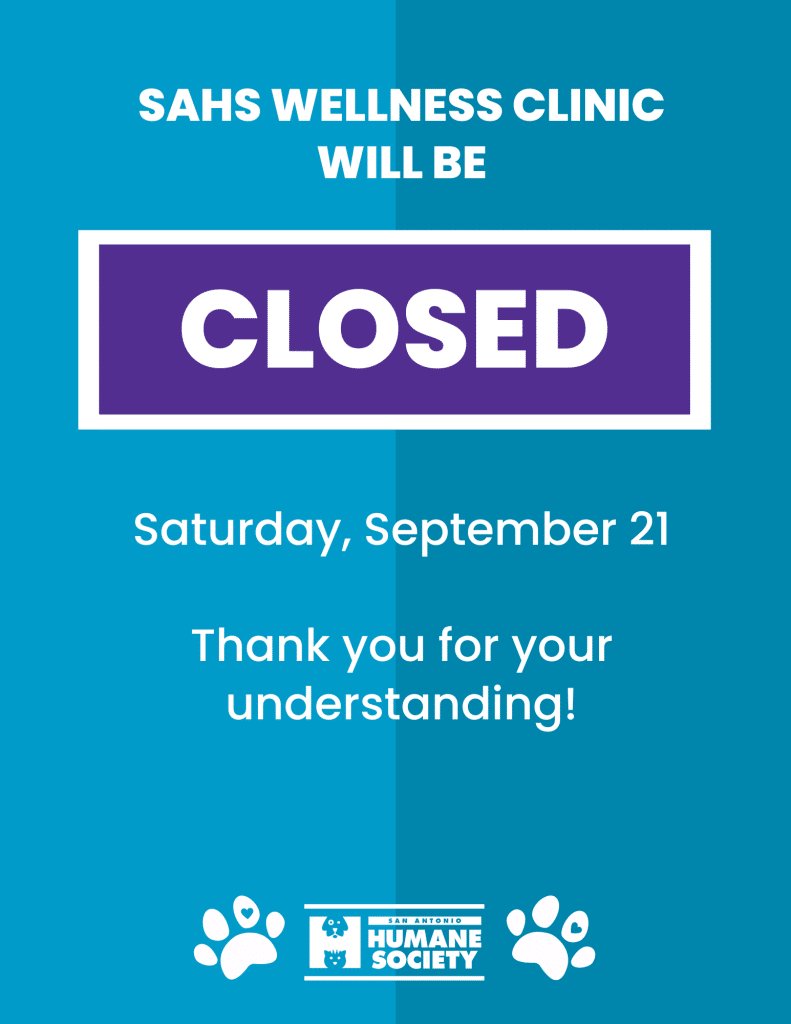How We Help
Medical Stories & Transfer Program
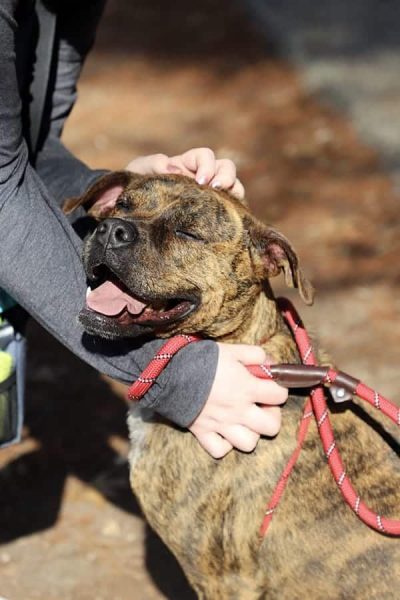
At the San Antonio Humane Society, we make every effort to find the best home for the pets in our care. Sadly, many of the dogs and cats that come to us have been abused, neglected, injured, or have chronic illnesses. These injured or ill animals are treated based on the funds available at the time of intake or illness. Through the Michaels Medical Rescue Fund, you can choose to make a contribution to a special needs animal. This will decrease the costs associated with the provision of necessary medical care they need and deserve. Once these animals are healthy, they will then be available to the public for adoption. We appreciate any contribution offered.
The San Antonio Humane Society is here to support the homeless and orphaned pets of our community. The majority of our animal intake is devoted to the care and rehabilitation of animals brought to us by the citizens of San Antonio. These animals can be found as strays or owned pets that the individual surrendering the animal can no longer care for. However, we recognize that only through partnerships and collaboration, can San Antonio ever reach a no-kill goal.
Our partnerships also include other shelters and rescue groups in our area. The joint efforts of these collaborations save hundreds of animals who are facing euthanasia. Occasionally we learn of shelters in need outside of San Antonio and as time and resources allow we travel to these shelters and help as we can. Every animal deserves a chance and our transfer program ensures that as many animals as possible receive the hope of a better tomorrow.
What We Do - Medical Stories
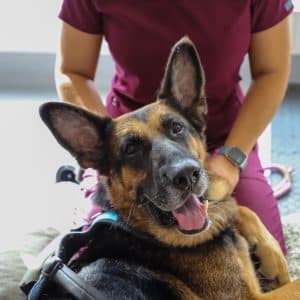
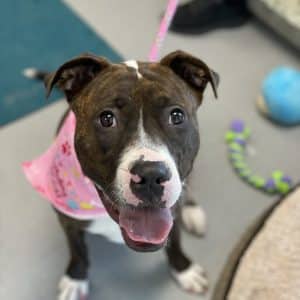
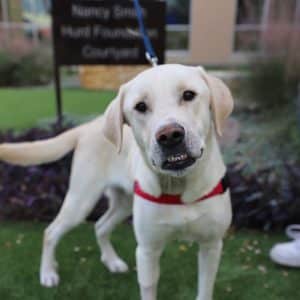

Disaster Preparedness
Natural disasters and emergencies happen quickly, and often we are not fully prepared. Being properly equipped to meet the needs of your family – including our four-legged loved ones – when an emergency does strike, is crucial. Think ahead and take steps now to be prepared. You’ll feel better knowing you’ve planned for what to do before, during, and after a major storm or unexpected emergency. The San Antonio Humane Society has compiled the resources below to help our community members guard their pets’ health and safety in the event of a disaster or emergency.
- Make sure your pet is microchipped and the registration is up-to-date.
- Keep your pets vaccinations current and your paperwork easily accessible. Pet shelters may require proof of vaccines.
- Be sure to keep a collar with proper identification and rabies tag on your pet.
- Spay or neuter your pet so it won’t become pregnant or impregnate other animals if becomes lost in an emergency.
- Research and make a list of potential refuges for your pet including shelters, veterinary clinics, friends and relatives.
- Make a list of pet friendly hotels/motels. You can download and print our list of San Antonio area pet-friendly hotels for help.
- Pet owners should keep an emergency pet supply kit on hand at all times. Use a waterproof, easily transportable container.
- Bring your pets inside well in advance of a storm.
- Never leave a pet chained outside.
- Pets can become frightened by unfamiliar noises. Keeping your pet within sight when possible will reassure him.
- Never tranquilize your pets. It might inhibit their natural survival instincts needed to escape potential danger.
- If you are instructed to evacuate, bring your pets with you! If animals are left behind they may get injured or lost. List of pet friendly hotels in San Antonio, and beyond, can be and also on this page.
- Have your pet emergency kit at hand.
- Help re-orient your pets to their home by walking them on a leash. They may be confused or lost if landmarks and familiar scents are altered.
- Be on the look out for downed power lines, debris and reptiles brought in with high water that could pose danger.
- Contact your local animal control office if a pet is missing to find out where lost animals can be recovered. Bring a recent picture of your pet, tattoo number or microchip number.
- Don’t allow your pet to drink water or eat food that may have been contaminated.
- Animals can become aggressive or defensive after a disaster. Monitor their behavior and contact your veterinarian with questions if it does not subside.
- In the days and weeks that follow a natural disaster, displaced people and companion animals face many dangers. Many natural disasters create hazardous, life-threatening situations for helpless strays and displaced pets.
- Homes, landmarks and familiar scents that animals use to find their way home or recognize safe areas can simply vanish after a disaster. This causes disorientation, panic and stress, and leads dogs and cats seeking refuge into hazardous situations.
- Floodwaters contaminated with waste and bacteria can cause intestinal parasites and gastroenteritis. Most forms of water borne bacteria are transmittable to both animals and humans, resulting in widespread infection.
- Animals trying to swim in floodwaters can quickly become exhausted and drown.
- Floating hazards such as building materials, tree limbs and street signs can cause severe injury to animals and result in infections.
- Downed power lines and the extension of water hazards expand the territories of alligators and snakes that pose a deadly threat to pets.
- In addition to water supplies, food sources become contaminated as well. Displaced dogs and cats are frightened, thirsty and very hungry and do not understand that they should steer clear of standing water and any food they may find.
- SAHS to help transport approximately 100+ cats and dogs affected by Hurricane Ian
- Group of evacuated pets arrive at the SAHS ahead of Hurricane Ida
- Nearly 90 evacuated pets arrive at SAHS ahead of Hurricane Laura
- SAHS Works With PAART to Fly 20+ Pets to Pennsylvania
- As Need for Shelter Builds, Rescue Team to Transport Pets Up North
- Louisiana Flood Victims
- San Antonio Humane Society/ADL Transfer of Houston Animals
- Hurricane Ike
- Volunteers Needed!
- Volunteers Step Up for Hurricane!
- Eagle Pass Emergency
Disaster Relief in Action
- Hurricane Ian
- Hurricane Ida
- Hurricanes Laura & Sally
- Hurricanes Harvey
- Louisiana Flooding
- Hurricane Ike
- Hurricane Gustav
- Eagle Pass Tornado
October 3, 2022. The SAHS is preparing to help transport shelter dogs and cats in Escambia County, Florida directly affected by Hurricane Ian. SAHS staff and volunteers are currently preparing kennel areas and assembling crates that will be used to transport the incoming pets. By assisting with this transport, the SAHS is hoping to give these dogs and cats a second chance at finding forever homes, while also freeing up much-needed space in the Florida shelters deeply affected by the hurricane.
“In moments like this, it is more important than ever that we come together and help our rescue partners in need,” SAHS President/CEO Nancy F. May said. “We are proud to be a part of this lifesaving mission, and we look forward to helping these vulnerable animals find their homes across our community.”
The dogs and cats will become available for adoption through the SAHS adoption process once they are cleared by veterinarians. If you would like to support SAHS’s hurricane rescue efforts, the shelter is accepting monetary donations and supplies such as dog/cat beds, paper towels, canned chicken, kitten formula (KMR), blankets, towels, cleaning supplies (Lysol disinfecting wipes), treats, Feliway and Adaptil sprays, dog leashes, cat litter, toys, and wet canned pet food.
September 2021. Our second transfer from Louisiana has finally arrived!! A total of 154 pets – 104 cats and 50 dogs – were welcomed overnight at 1:30 a.m. by our amazing SAHS team and volunteers after a long drive from Louisiana. This amazing, large transfer effort was made possible thanks to our rescue partner, Best Friends Animal Society, who drove them straight to our shelter! This is our largest single animal intake that we’ve ever done, and it couldn’t have been possible without the incredible help of our medical team, kennel staff and dedicated volunteers!! (A HUGE THANK YOU TO YOU ALL!!) They are still working around-the-clock to ensure all of our new pets feel safe and comfortable. Our rescued pets are currently being walked, bathed, fed, socialized, and some are even receiving medical treatment. They will be made available for adoption as soon as our veterinarians medically clear them!
August 2021. The SAHS team drove and met the Houston SPCA team halfway this morning to transport the dogs back to the shelter. SAHS staff and volunteers helped set up the areas that will house the pets, as well as assisted with the unloading, bathing and other tasks needed to make them feel comfortable and safe. “We’re grateful to be able to stand ready to assist displaced animals as Hurricane Ida continues to threaten our Gulf Coast,” SAHS President/CEO Nancy F. May said. “By relocating shelter pets from areas at high risk for damage, we are both bringing those animals to safety and freeing up much-needed space and resources for displaced pets after the storm.” All of the animals will be available for adoption through SAHS’s adoption process once they are cleared medically by veterinarians.
August 26, 2020. The San Antonio Humane Society (SAHS) is taking in nearly 90 cats and dogs to help assist shelters along the Gulf Coast in advance of Hurricane Laura. The first group of pets, 20 dogs and 10 cats, were flown in from the Jefferson Parish Animal Shelter in New Orleans to San Marcos, Texas last night with the help of Wings of Rescue. When they arrived at 8:30 p.m., a SAHS team was already there ready to greet them and help transport them to the shelter. The SAHS also coordinated and helped transport 39 cats, 9 dogs and 11 4-month-old puppies from the Humane Society of South East Texas in Beaumont, Texas this morning. The SAHS team left at 4 a.m. with three vehicles and picked up the animals to ensure the shelter has space for relief efforts before and after the hurricane, which has strengthened to Category 4 and is expected to make landfall Wednesday night into early Thursday near the border between Louisiana and Texas. Donations are also being accepted to support relief efforts. Read more here!
September 5, 2017. Since Hurricane Harvey began its devastation along the Texas coast, the San Antonio Humane Society (SAHS) continues to shelter and assist 260+ pets displaced and at risk due to the destructive weather. Among these evacuees are pets forced to temporarily seek shelter at the SAHS due to the total loss of their homes and shelter pets transferred from the gulf coast due to hazardous conditions and loss of resources. The SAHS has already made multiple trips to flooded and devastated areas to deliver supplies and rescue dogs and cats in need, and dozens more are on their way. We are currently working with several partners on a national level, to clear our shelter and make room for more storm victims and evacuees as the need arises. Report from Charity Navigator – One Year Later, Hurricane Harvey
Tuesday, May 17th 2011, the San Antonio Humane Society traveled to Houston and met with the Louisiana SPCA to pick up 19 animals that had been relocated due to the recent flooding in the South. The Louisiana SPCA and Houston SPCA called upon the SAHS to help with animal overcrowding after the Morganza Spillway was opened.
The San Antonio Humane Society was involved in relief efforts to aid areas being affected by Hurricane Ike. Over 230 animals were transferred to our facility from Houston, Galveston, and Corpus Christi, including, 50 baby squirrels that we transported from Houston to be transferred to the San Antonio Wildlife Rescue.
Read our Special Hurricane Newsletter!
When the San Antonio Humane Society responded to requests for help in Maverick County due to the F3 tornado, we went to assess animals for the sole purpose of providing immediate emergency medical care, boarding of owned animals, and feeding of animals that were left alone in homes. We cared for 67 animals for 5 days at Maverick County Animal Control until the Houston SPCA Disaster Response team could take over on April 30th, 2007. When we left, many owners had identified their animals, and Houston SPCA was in the process of transferring animals to the city shelter of Eagle Pass.

